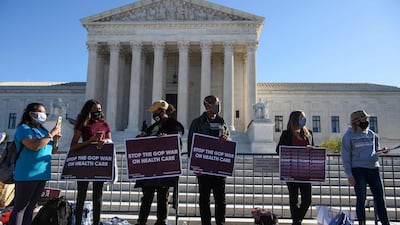Joe Biden will not want to lose Washington’s chief Arab allies, although there may be some initial “tactical coolness” in his dealings with them, according to Egypt’s former foreign minister Nabil Fahmy.
Speaking at his home in the upmarket Cairo district of Zamalek, Mr Fahmy, a former ambassador to the US who had dealings with Mr Biden for years as a senator, painted a picture of an Arab Middle East where nations are left to resolve their differences regionally.
The US under Mr Biden will not entirely ignore the Middle East, Mr Fahmy said, but focus on checking Russia’s influence, stopping Iran’s growing meddling in Arab affairs and ending Turkey’s “abrasive” behaviour.
Equally, he said, Arabs will continue to view the US as a world power they can look to when needed, but will increasingly attempt to enhance their own security capacities and deal with regional problems.
“The United States will always be a major component of the world community that Arabs cannot ignore … but will be less dependent on them, he said.
Mr Fahmy, 69, singled out regional heavyweights Egypt, the UAE and Saudi Arabia as Washington’s chief Arab allies. He said they and the US wanted to see a centrist, modern and progressive Middle East that rejects extremism.
“There may be some tactical Middle East policy differences between [US President Donald] Trump and Biden,” he said.
“Biden will focus on some issues that Trump did not raise in order to prove to his own domestic constituencies that he is different from Trump.
“You may see some tactical coolness … but Biden will not want to sacrifice US interests with these countries.”
Egypt, the UAE and Saudi Arabia, at variable levels, are bound to Washington by vast economic and military ties, as well as common strategy against the Soviet Union during the Cold War and later against Islamic militancy. Curtailing Muslim, but non-Arab, Iran’s expansion of influence through proxies or loyal regimes in Lebanon, Iraq, Syria, Lebanon and Yemen is also a key issue.
Relations grew even deeper with President Trump in the White House over the past four years. But with the Republican leader defeated by Mr Biden in the November 3 election, they are facing media reports that they have viewed the results with some alarm.
Mr Fahmy, who heads a think tank linked to the American University in Cairo, said that Arab nations must realise that their region was no longer top of the global agenda.
“The Middle East may have shifted in priority, but it will always remain somewhere on the American agenda,” he said.
Mr Fahmy used the Palestinian-Israeli conflict as an example of how the US has grown less engaged in the region in recent years.
He said Mr Biden, whose zealous support for Israel is a matter of public record, was unlikely to rescind any of the measures taken by Mr Trump, such as recognising Jerusalem as Israel’s capital or endorsing the annexation of Syria’s Golan Heights.
Mr Biden, however, will attempt to engage the Palestinians and appear receptive to proposals to resolve the conflict.
“Biden will certainly engage the Palestinians more than Trump did and will be more sensitive to their concerns, but he will not expend any political capital to rescind Trump’s measures,” he said.
















